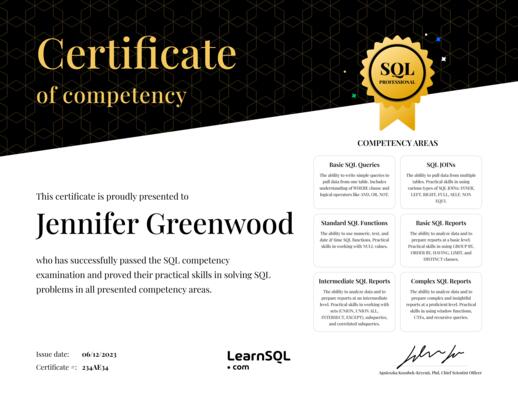Advanced Course
Recursive Queries in PostgreSQL
In this online course, you will master PostgreSQL recursive queries, also known as WITH clauses, and common table expressions (CTEs).
4.82
2,860 learners enrolled
Free trial Yes
Certificate of completion Yes
Time to complete 18 h
Coding challenges 114
Skills you will gain
- Understand and use basic recursive queries in PostgreSQL.
- Split long SQL queries with simple and nested common table expressions (CTEs).
- Deploy recursive CTEs.
- Write recursive queries in PostgreSQL that traverse a hierarchical data model.
Last reviews

Table of contents
Course progress 0%
Exercises completed 0/114
-
Intro Quiz
0/14Test your knowledge of PostgreSQL
-
CTE syntax
0/17Your first encounter with Common Table Expressions
-
Nested CTEs
0/15You'll get to know how to use nested CTEs
-
Recursive CTEs
0/36You'll find out what recursion is and how to use it in SQL queries
-
Using CTEs with INSERT, DELETE, and UPDATE
0/18You'll learn how to use INSERT, DELETE, and UPDATE statements with CTEs.
-
Final Quiz
0/14Test your knowledge in this final quiz.

Get the Certificate of Competency in SQL
This certificate will confirm your practical SQL problem-solving skills

Description
This online course is intended for intermediate users and will benefit beginner data analysts, IT students, business developers, and more. The prerequisite is understanding the basics of SQL presented in our SQL Basics in PostgreSQL course followed by some practice.
Recursive queries are often called WITH clauses and are essentially just named subqueries. It is a fairly new feature of SQL that allows you to manage a long query and break it into smaller, more readable chunks. Unlike SQL subqueries, recursive queries allow the traversal of hierarchical models with enormous depth. Using recursive queries, you can process hierarchical structures, such as graphs and trees; for example, you can find the shortest path between two cities using a railway network or the length of the "chain of command" from a regular employee to the CEO.
In this online course, you will learn simple, common table expressions (CTEs), nested CTEs, and recursive CTEs. You will also discover how to manage a PostgreSQL query with a CTE, when to nest CTEs, and how to use recursive CTEs to move through hierarchical data models.

What's in It for Me?
- 114 interactive exercises. Learn at your own pace, from any location and at any time. Work through hands-on exercises to help you retain what you have learned so far.
- Lifetime access to the course. When you purchase the online course, you'll get instant personal access to all of its content forever.
- Certificate of completion. After you successfully finish all of the exercises in the online course, you'll receive a downloadable PDF certificate to showcase your accomplishment.
- 30-day money-back guarantee. If you're not satisfied with the quality of the online course, you can get a refund within 30 days of your purchase.
- Exercise hints. You can take advantage of ready-made hints for every exercise, or ask questions and share insights with other members of our community through the Discuss tab.
What do You Need to Take This Course?
- A web browser
- Consolidated knowledge of SQL Basics in PostgreSQL
Learn How to:
- Understand and use basic recursive queries in PostgreSQL.
- Split long SQL queries with simple and nested common table expressions (CTEs).
- Deploy recursive CTEs.
- Write recursive queries in PostgreSQL that traverse a hierarchical data model.
Who Should Take This Course?
- Analysts who know SQL and need or want to improve their skills, such as by learning how to use a PostgreSQL recursive query
- Business developers who wish to work with SQL
- Beginner data scientists
- Students taking classes in relational databases
- Anyone who knows SQL and wants to refine it or keep track of current trends
- Anyone interested in a database-related career